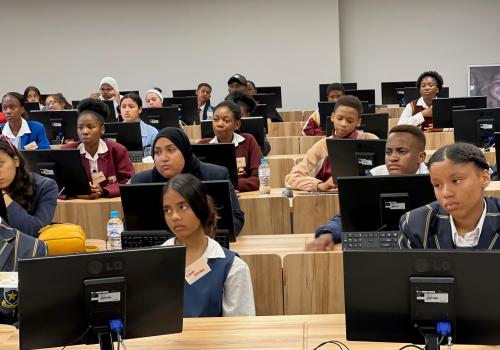The Southern African Development Community (SADC) and the United Nations Education, Scientific and Cultural Organisation (UNESCO) Regional Office for Southern Africa in partnership with Department of Science and Innovation (DSI), Department of Basic Education (DBE), the Western Cape Education Department (WCED) and the Nelson Mandela Children’s Fund in South Africa; held a boot camp targeted at Science, Technology, Engineering, and Mathematics (STEM). instructors and learners on the margins of the World Science Forum which took place in Cape Town, South Africa on the 5th to 9th December, 2022. The Boot camp was held under the theme: “Re-imagining and Re-thinking STEM Education in the Fourth Industrial Revolution”. The Boot Camp focused on the key topics: Robotics, Aritificial Intelligence, 3D Printing and Microscience Training Boot Camp.
The main objective of the training workshop was to expose trainers to different instructional strategies using the latest advanced technologies such as Artificial intelligence (AI and robotics as well as micro-science kits which have been minimally exploited in educational contexts in Africa. The training also equipped the learners and teachers with hands-on experience on the different innovative technologies to enhance their confidence in the use of such tools.
UNESCO provided the Microscience kits as part of UNESCO’s Global Microscience Experiments Project that gives primary and secondary school pupils as well as university students the opportunity to conduct practical work in physics, mathematics, chemistry, and biology, using kits with a teaching manual illustrating the different experiences.
The learners were taught on AI, Robotics and Gamification of STEM.
Artificial Intelligence is a branch of computer science that involves developing computer programs to complete tasks which would otherwise require human intelligence. AI algorithms can tackle learning, perception, problem-solving, language-understanding and/or logical reasoning. AI has been considered as a powerful tool in bridging the gender gap in STEM education.
Robotics is a branch of technology which deals with the design, construction, operation and application of robots and computer systems. Robots are programmable machines which are usually able to carry out a series of actions autonomously, or semi-autonomously; inspire youths towards science, engineering and technology. Robotics, AI and microscience inspire children and youths towards science, engineering and technology.
Gamification of STEM and simulations just like AI and robotics, encourage deeper learning as opposed to abstract understanding of STEM concepts and processes, and contribute to the development of STEM skills. The use of innovative technologies in the teaching of STEM fields also develops in learners, the ability to think critically and innovatively, boosts their motivation, and addresses the curiosity that they bring to the classroom contexts.
Mr. Calicious Tutalife, Acting Director for Industrial Development and Trade at SADC Secretariat highlighted that technology and innovation are the main drivers for development and growth, as witnessed by the emergence of new and emerging technologies such as Artificial Intelligence. He said Artificial intelligence, robotics and machine learning is the future, hence, it is important to equip the young generation with the new and innovative technologies to advance the Region’s economies into knowledge based economies.
He acknowledged that SADC exists to improve economic growth and development, alleviate poverty, enhance the quality of life of the people of the region. Therefore, it recognises the important role and contribution of science, technology and innovation (STI) in political, economic and social development of the region in order to inter alia facilitate industrial development, competitiveness, regional integration and cooperation.
Mandry Ntshani, Director, Africa Multilateral Cooperation from the Department of Science and Innovation in South Africa said the department has adopted the 2019 White Paper on Science Technology and Innovation that talks to the need for various departments to collaborate with the aim of building the science, technology, engineering and Mathematics (STEM) pipeline.
She further mentioned that the Department of Science and Innovation has committed to put in place specific interventions for learners to become digitally literate and has prioritised the need for the application of Science, Technology and Innovation to address societal grand challenges. Therefore, they aim to support the education and skills value chain from early childhood development throughout the colleges and universities. This also includes equipping learners with skills that respond to the Fourth Industrial Revolution and the skills for the future that is required by the future of work.
The boot camp targeted 250 learners and 50 teachers from Secondary Schools particularly from the disadvantaged areas in the Western Cape. The boot camp ended on the 8th December 2022 at the University of Western Cape with a closing ceremony with the leaners, teachers, facilitators and partners. The closing ceremony was attended by representatives from UNESCO – Prof Lidia Brito (Director for the Regional Office); Ms Anneline Morgan (SADC Secretariat); Ms Angela Melo (Director: Social and Human Science –Paris); University of the Western Cape and Western Cape Education Department. Out of the 250 learners who participated in the Boot camp, 51 learners were selected to attend the official closing ceremony of the World Science Forum 2022 at the Cape Town Intentional Convention Centre. The Learners demonstrated to the delegates and audience of the Forum what they were taught at the 4 day booth camp.

